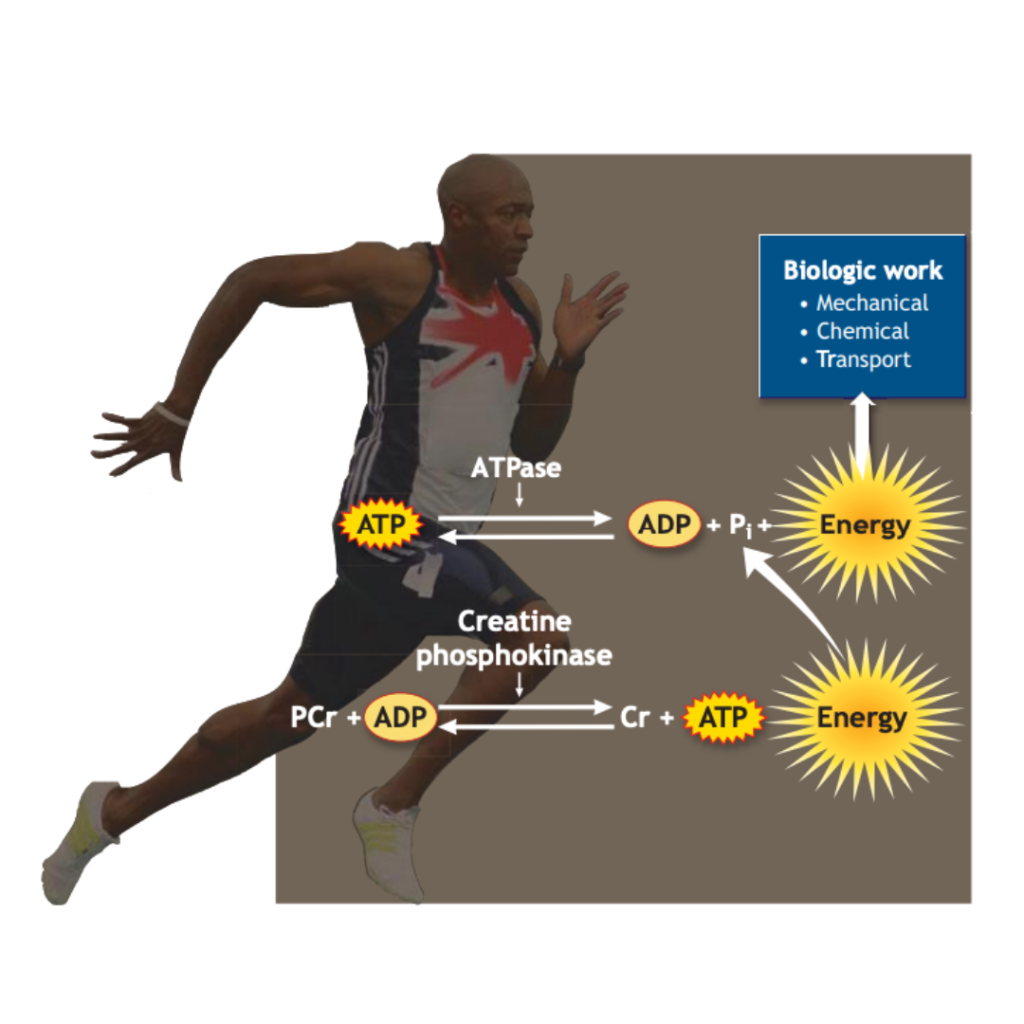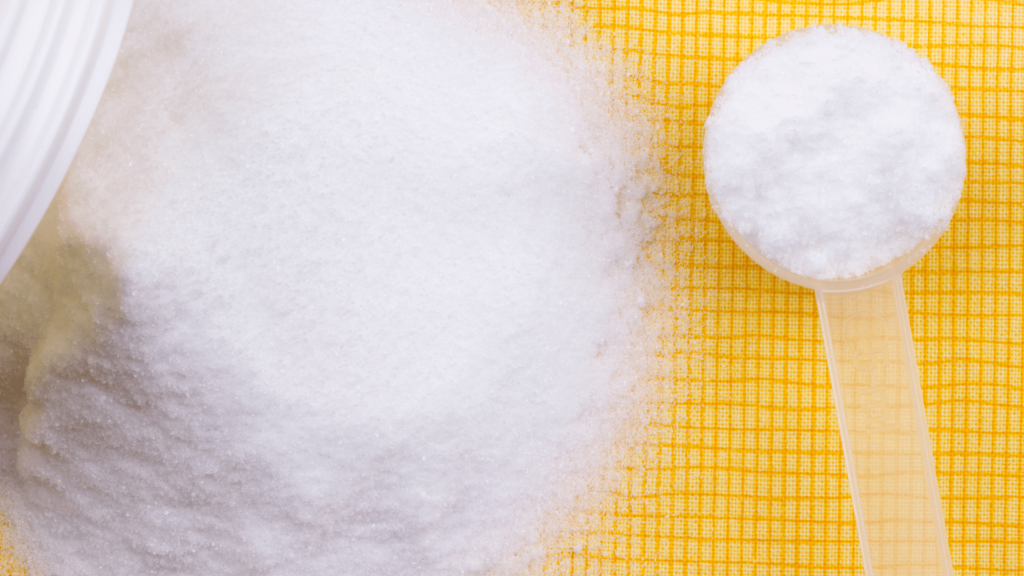Creatine is one of the most widely used supplements, commonly favored by athletes looking to enhance their physical performance. Numerous clinical trials have confirmed its effectiveness in improving exercise performance and training adaptations.
Currently, creatine monohydrate is the most extensively studied and clinically proven form of creatine in muscle absorption and boosting high-intensity exercise capacity.
In recent years, creatine’s popularity has skyrocketed, especially among athletes. In the United States alone, dietary supplements containing creatine make up a significant portion of the estimated $2.7 billion in annual sports nutrition supplement sales. It’s estimated that Americans consume approximately 4 million kilograms of creatine per year.
Benefits of Creatine Supplementation:
• Enhanced post-workout recovery
• Injury prevention
• Increased maximum strength and power
• Improved ability to perform repeated high-intensity efforts
• Enhanced speed and performance in high-intensity exercises
• Increased muscle mass
• Greater training capacity
• Faster recovery during rehabilitation
• Reduced fatigue
Creatine monohydrate supplementation is not only safe but also beneficial in preventing injuries and managing specific medical conditions when taken as recommended.
Can Women Take Creatine?
Both men and women have reported benefits from creatine supplementation. While most studies have focused on men, some research suggests that women may not experience as significant strength or muscle mass gains as men. However, women can still benefit from creatine in their training.
What is Creatine?
Creatine, part of the phosphagen family, is a non-protein amino acid compound naturally found in red meat and seafood. Around 95% of the body’s creatine is stored in skeletal muscles, while smaller amounts are found in the brain and testicles. Two-thirds of intramuscular creatine is stored as phosphocreatine (PCr), with the remainder existing as free creatine.
Approximately 1-2% of intramuscular creatine degrades into creatinine daily and is excreted through urine. Therefore, the body needs to replenish about 1-3 grams of creatine daily to maintain normal levels. Half of this daily requirement typically comes from diet, while the rest is synthesized in the liver and kidneys.
For instance, one pound of raw beef or salmon provides between 1-2 grams of creatine. The remaining creatine is synthesized primarily in the liver from arginine and glycine.
The Role of Creatine in the Body
The primary metabolic role of creatine is to combine with inorganic phosphate (Pi) to form PCr through the creatine kinase (CK) enzymatic reaction. This process helps resynthesize ATP, the energy currency of the body, during muscle contractions, especially in short, high-intensity efforts like weightlifting.

By boosting creatine stores, athletes can sustain energy levels during repeated bouts of high-intensity exercise, which is why creatine is often linked to improvements in power output and muscle performance.
Creatine Storage in the Body
The total creatine pool in muscles averages about 120 mmol/kg of dry muscle mass in a 70 kg individual. However, the upper limit for creatine storage can reach around 160 mmol/kg of muscle mass. Vegetarians, who often have lower intramuscular creatine stores, can see more significant increases when they supplement with creatine.
Supplementation Protocols
Research indicates that creatine supplementation can enhance intramuscular creatine and phosphocreatine levels by 10-40%. To effectively increase these stores, a daily dose of 5 grams of creatine monohydrate is recommended. The specific timing of the intake isn’t critical, as long as you consistently take it every day.
Alternative Forms of Creatine
While several forms of creatine are available, creatine monohydrate remains the most studied and proven. Claims that newer forms of creatine, such as creatine citrate, creatine ethyl ester, or buffered creatine, offer superior benefits are largely unsubstantiated by research. Creatine monohydrate continues to be the most effective and affordable option.
Health Risks and Safety of Creatine Supplementation
Since creatine monohydrate became popular in the 1990s, more than 1,000 studies have been conducted, and billions of servings have been consumed. The only consistently reported side effect is weight gain, attributed to water retention within muscle cells.
Short- and long-term studies, ranging from infants to the elderly, have shown that creatine supplementation poses no significant health risks, even at higher doses (0.3-0.8 g/kg/day) over periods of up to five years. Creatine has been linked to numerous health and performance benefits without serious side effects.
Anecdotal claims of adverse effects, such as dehydration, muscle cramps, or gastrointestinal discomfort, have been debunked in well-controlled clinical studies. Furthermore, creatine supplementation has not been associated with renal dysfunction or long-term health issues. On the contrary, creatine has been found to reduce the incidence of many of these side effects.
Creatine and Caffeine Interaction
One commonly asked question is whether caffeine interferes with creatine supplementation. Early studies suggested that caffeine might reduce the effectiveness of creatine, with one study from 1996 proposing that caffeine counteracts creatine’s benefits. However, later research, including work by renowned researcher Eric Trexler, found no significant differences between creatine supplementation with or without caffeine.
The scientific community remains divided on this issue, as some studies show interference while others do not. Until further research clarifies the matter, it may be wise to consume caffeine and creatine separately or avoid high doses of caffeine when taking creatine to maximize muscle benefits.
References
- Kreider, R. B., Kalman, D. S., Antonio, J., Ziegenfuss, T. N., Wildman, R., Collins, R., Candow, D. G., Kleiner, S. M., Almada, A. L., & Lopez, H. L. (2017). International Society of Sports Nutrition position stand: safety and efficacy of creatine supplementation in exercise, sport, and medicine. Journal of the International Society of Sports Nutrition, 14, 18.
- Hall, M., & Trojian, T. H. (2013). Creatine supplementation. Current sports medicine reports, 12(4), 240–244.
- Balsom, P. D., Söderlund, K., & Ekblom, B. (1994). Creatine in humans with special reference to creatine supplementation. Sports medicine (Auckland, N.Z.), 18(4), 268–280.
- Kreider R. B. (2003). Effects of creatine supplementation on performance and training adaptations. Molecular and cellular biochemistry, 244(1-2), 89–94.
- Schilling, B. K., Stone, M. H., Utter, A., Kearney, J. T., Johnson, M., Coglianese, R., Smith, L., O’Bryant, H. S., Fry, A. C., Starks, M., Keith, R., & Stone, M. E. (2001). Creatine supplementation and health variables: a retrospective study. Medicine and science in sports and exercise, 33(2), 183–188.
- Lanhers, C., Pereira, B., Naughton, G., Trousselard, M., Lesage, F. X., & Dutheil, F. (2017). Creatine Supplementation and Upper Limb Strength Performance: A Systematic Review and Meta-Analysis. Sports medicine (Auckland, N.Z.), 47(1), 163–173.
- Lanhers, C., Pereira, B., Naughton, G., Trousselard, M., Lesage, F. X., & Dutheil, F. (2015). Creatine Supplementation and Lower Limb Strength Performance: A Systematic Review and Meta-Analyses. Sports medicine (Auckland, N.Z.), 45(9), 1285–1294.
- Buford, T. W., Kreider, R. B., Stout, J. R., Greenwood, M., Campbell, B., Spano, M., Ziegenfuss, T., Lopez, H., Landis, J., & Antonio, J. (2007). International Society of Sports Nutrition position stand: creatine supplementation and exercise. Journal of the International Society of Sports Nutrition, 4, 6.
- Bird S. P. (2003). Creatine supplementation and exercise performance: a brief review. Journal of sports science & medicine, 2(4), 123–132.
- Hultman, E., Söderlund, K., Timmons, J. A., Cederblad, G., & Greenhaff, P. L. (1996). Muscle creatine loading in men. Journal of applied physiology (Bethesda, Md. : 1985), 81(1), 232–237.
- Askow, A. T., Paulussen, K. J. M., McKenna, C. F., Salvador, A. F., Scaroni, S. E., Hamann, J. S., Ulanov, A. V., Li, Z., Paluska, S. A., Beaudry, K. M., De Lisio, M., & Burd, N. A. (2022). Creatine Monohydrate Supplementation, but not Creatyl-L-Leucine, Increased Muscle Creatine Content in Healthy Young Adults: A Double-Blind Randomized Controlled Trial. International journal of sport nutrition and exercise metabolism, 32(6), 446–452.
- Fazio, C., Elder, C. L., & Harris, M. M. (2022). Efficacy of Alternative Forms of Creatine Supplementation on Improving Performance and Body Composition in Healthy Subjects: A Systematic Review. Journal of strength and conditioning research, 36(9), 2663–2670.
- Morton, R. W., Murphy, K. T., McKellar, S. R., Schoenfeld, B. J., Henselmans, M., Helms, E., Aragon, A. A., Devries, M. C., Banfield, L., Krieger, J. W., & Phillips, S. M. (2018). A systematic review, meta-analysis and meta-regression of the effect of protein supplementation on resistance training-induced gains in muscle mass and strength in healthy adults. British journal of sports medicine, 52(6), 376–384.
- Jäger, R., Purpura, M., Shao, A., Inoue, T., & Kreider, R. B. (2011). Analysis of the efficacy, safety, and regulatory status of novel forms of creatine. Amino acids, 40(5), 1369–1383.
- Vandenberghe, K., Gillis, N., Van Leemputte, M., Van Hecke, P., Vanstapel, F., & Hespel, P. (1996). Caffeine counteracts the ergogenic action of muscle creatine loading. Journal of applied physiology (Bethesda, Md. : 1985), 80(2), 452–457.
- Trexler, E. T., Smith-Ryan, A. E., Roelofs, E. J., Hirsch, K. R., Persky, A. M., & Mock, M. G. (2016). Effects of Coffee and Caffeine Anhydrous Intake During Creatine Loading. Journal of strength and conditioning research, 30(5), 1438–1446.
- Trexler, E. T., & Smith-Ryan, A. E. (2015). Creatine and Caffeine: Considerations for Concurrent Supplementation. International journal of sport nutrition and exercise metabolism, 25(6), 607–623.
- Guest, N. S., VanDusseldorp, T. A., Nelson, M. T., Grgic, J., Schoenfeld, B. J., Jenkins, N. D. M., Arent, S. M., Antonio, J., Stout, J. R., Trexler, E. T., Smith-Ryan, A. E., Goldstein, E. R., Kalman, D. S., & Campbell, B. I. (2021). International society of sports nutrition position stand: caffeine and exercise performance. Journal of the International Society of Sports Nutrition, 18(1), 1.
- Guest, N. S., VanDusseldorp, T. A., Nelson, M. T., Grgic, J., Schoenfeld, B. J., Jenkins, N. D. M., Arent, S. M., Antonio, J., Stout, J. R., Trexler, E. T., Smith-Ryan, A. E., Goldstein, E. R., Kalman, D. S., & Campbell, B. I. (2021). International society of sports nutrition position stand: caffeine and exercise performance. Journal of the International Society of Sports Nutrition, 18(1), 1.

